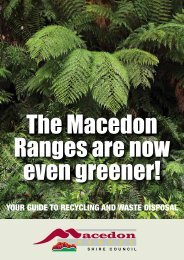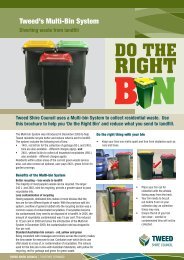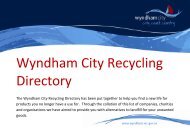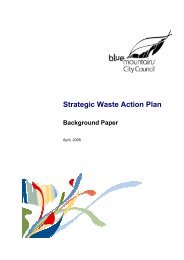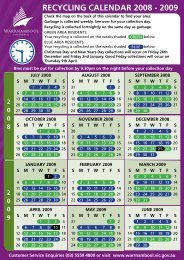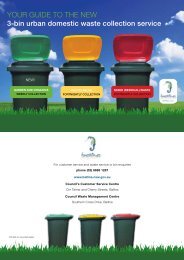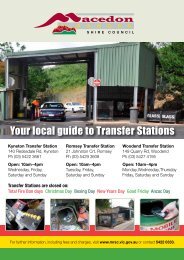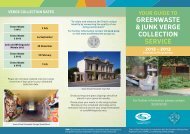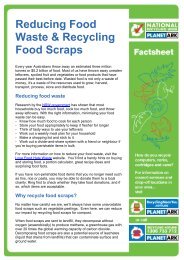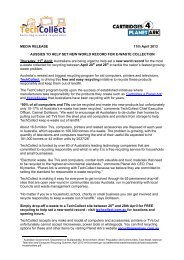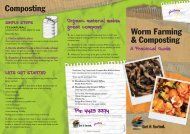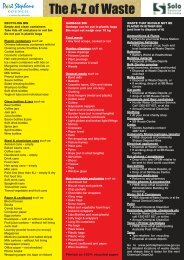ICC4758 New Residents Waste Booklet.indd - Recycling Near You
ICC4758 New Residents Waste Booklet.indd - Recycling Near You
ICC4758 New Residents Waste Booklet.indd - Recycling Near You
- No tags were found...
You also want an ePaper? Increase the reach of your titles
YUMPU automatically turns print PDFs into web optimized ePapers that Google loves.
ContentsMessage from the MayorMessage from the ChairpersoniiThe 3R’s: Reduce, Reuse and Recycle! 2Ipswich <strong>Waste</strong> Services 3Wheelie Bin Refuse and <strong>Recycling</strong> Service 4Kerbside wheelie bin service FAQs 5What goes in the recycling bins? 6What happens at a Material Recovery Facility? 7Public Resource Recovery Facilities 8What do the Public Resource Recovery Facilities accept? 9Temporary Skips and Additional <strong>Waste</strong> Services 10What a <strong>Waste</strong>! 11Composting 12Worm farming 13http://waste.ipswich.qld.gov.au
The 3R’s: Reduce, Reuse and Recycle!Reducing, Reusing and <strong>Recycling</strong> offers an alternative to disposing of waste at the landfill. Adopting the 3R’sis an easy way of helping to minimise waste in an environmentally friendly way!Reduce: Cut down on the amount of rubbish being produced by reducing the material we buy thatultimately becomes waste. This can be done by:• Buying products that have less packaging and/ or packaging that can be recycled.• Buy in bulk wherever possible.• Use reusable bags/ green bags as an alternative to plastic bags.• Borrow items that are not used very often.Reuse: Before throwing anything away, think about how it could be reused.• Reuse old envelopes for shopping lists or telephone notepads.• Buy products that can be refilled.• Reuse plastic containers and bottles.• Donate old clothes and toys to a charity shop.• Donate read magazines to doctor’s surgeries.Recycle: This is the process of creating new products from discarded goods. A full list of items that canbe recycled is given on page 6.The recyclable items placed in the yellow-lidded recycling bin are taken to the Material Recovery Facility(MRF). Here the items will be sorted and baled up before being sent to recycling manufacturers and turnedinto a wide range of new products. There are many products now available in the supermarkets that have beenrecycled or have recycled content.Read more about MRF’s on page 7.BeneFits of the 3R’sReducing, reusing and recycling:• conserves natural resources.• reduces greenhouse emissions and saves energy.• saves space at landfill.• creates jobs.2 http://waste.ipswich.qld.gov.au
Ipswich <strong>Waste</strong> ServicesIpswich <strong>Waste</strong> Services is a commercial business unit of Ipswich City Council. We have been established toensure that a high level of waste services is provided to the community of Ipswich City on a cost effectiveand commercial basis. We hold an agreement with the Ipswich City Council to provide the entire domesticwaste collection and disposal services within the City of Ipswich. Ipswich <strong>Waste</strong> Services also competesdirectly with private waste contractors for other waste collection and disposal services within Ipswich andsurrounding local government areas.At Ipswich <strong>Waste</strong> services, we are committed to providing quality products and services that provide value toour customers. Everyone at Ipswich <strong>Waste</strong> Services has a focus on customer satisfaction. We listen closelyto what our customers ask for and through effective communication, endeavour to meet or exceed theirrequirements. As a team, we offer experience, motivation and commitment in providing the best possibleservices for our clients. We are pleased to be of service and take pride in the quality of our work.We believe in:• Understanding the needs andexpectations of our customers.• Getting it right the first time and doingwhat we said we’d do.• Providing a cost effective andefficient service.• Explaining our decisions andkeeping our customers informed.• Being polite and helpful.• Doing everything reasonablypossible to make our servicesavailable to everyone, includingpeople with special needs.• Admitting if we don’t get it rightand putting things right quickly.Please contact us if we can assist you in any waywith your waste management needs.Craig WilsonManager Ipswich <strong>Waste</strong> Services.http://waste.ipswich.qld.gov.au3
Wheelie Bin Refuse and <strong>Recycling</strong>ServiceAll households are provided with a 240-litre green wheelie bin for refuse disposal. The refuse collectionservice is provided weekly.Households are also provided with a 240-litre wheelie bin with a yellow lid for recyclable waste only.Household recyclables are collected fortnightly.To check which day and week your bins are serviced, refer to your recycling calendar. A copy of the calendaris also available on the website.Bin servicing information• The refuse bins are emptied on the same day each week regardless of whether thecollection day is a public holiday (this includes Christmas Day and Good Friday).• The recycling bin is emptied every second garbage collection day. Refer to yourrecycling calendar for your recycling collection week.• Collection times vary from week to week. Therefore place you bins out the nightbefore or before 6:00am on the collection day.• Make sure the bin lids close properly. No rubbish or recyclables should protrude from the bins.This avoids spilt waste when the bin is emptied.• Ipswich <strong>Waste</strong> Services uses specially designed trucks to empty the bins so theirpositioning on the kerbside is important.What cannot be placed in the refuse bin• Building material.• Rocks, earth and weeds.• Loose garden waste.• Hazardous liquids: oil, fl ammable liquids and paint.• Hot ashes.These items can be taken to the Public Resource Recovery facilities. Refer to pages 8 & 9.4http://waste.ipswich.qld.gov.au
Kerbside wheelie bin service FAQs:Where should I place the bins?• Not more than one metre from the kerb or road edge.• In clear view of the road with the handles facing awayfrom the road.• With a space of approximately one metre betweenthe bins.Who owns the bins?Both bins remain the property of Ipswich City Council andshould not be used for any other purpose than the disposalof waste.What if one of my bins has beendamaged/ stolen?Please contact the Customer Call centre on 3810 6666 to arrange for the bin to be replaced. If the damage isonly minor, the bin will be repaired. The repair and replacement of bins damaged by normal wear and tear areprovided by Ipswich <strong>Waste</strong> Services at no additional cost to the resident or ratepayer.What do I do if my bin has been missed or is only half empty?If your bin has not been serviced, either email us at ipswichwasteservices@ipswich.qld.gov.au or contactIpswich City Council on 3810 6666 and tell the operator which bin has been missed – the refuse or recyclingbin. Ipswich <strong>Waste</strong> Services will attempt to return to service missed bins on the same day. However in caseswhere this is not possible, the service will be carried out on the next working day.Occasionally, a notice will be posted on the bin or placed in your letterbox giving a reason for non-collection.<strong>You</strong> may have to remove inappropriate material from the bin before it can be re-serviced or your bin may havebeen too heavy to service. Make sure you only place the correct items in both your refuse and recycling bin.If your bin has not been totally emptied, check to see if the bin is jammed with rubbish. Large cardboardboxes, lawn clippings and garden waste often cause this problem. Check your bin and loosen any waste thathas jammed. Rip up cardboard into smaller pieces and take large quantities of garden waste to the greenwaste disposal area at one of our Resource Recovery Facilities. Refer to page 8.To request a re-service for either of your bins,email ipswichwasteservices@ipswich.qld.gov.au orphone Ipswich City Council on 3810 6666.http://waste.ipswich.qld.gov.au5
What goes in the recycling bins?• Paper, newspapers, magazines.• Cardboard boxes, packaging, cartons (no waxed cardboard).• Glass bottles and jars.• Rigid plastic bottles and containers (no styrofoam).• Aluminium cans, steel cans and aerosols.To avoid contamination, place ONLY theseitems in your recycling bin.What NOT to recycle:• No plastic bags.• No crockery or china.• No mirrors, plate glass or light bulbs.• No garden waste or kitchen scraps.• No chemicals, gas bottles or oil.• No clothes, textile or fabric.• No plastic furniture, hose or pipe.• No disposable nappies, tissues or paper towels.• No syringes.Preparing items for recycling:• Please place recyclables loosely in the bin, NOT in plastic bags.• On plastic bottles and containers, look for the recycling symbol with a number from1-7 or R.• Rinse out all containers and remove lids.• Only recycle clean paper and cardboard.All recyclables are taken to a Material Recovery Facility (MRF). Read more about whathappens at the MRF on page 7.6http://waste.ipswich.qld.gov.au
What happens at aMaterial Recovery Facility (MRF) ?The recycled waste is collected from your home through the kerbside recycling system and is transferredto a Material Recovery Facility (MRF) at Gibson Island, Brisbane. At the MRF the comingled (mixed)recyclables are sorted into individual material categories and any contamination is removed. This is donemechanically and by hand.The sorting process consists of six basic processes:1. Upon arrival the recyclables are emptied into a receiving hopper.2. The primary sorting of materials happens in a number of trommels (large drums with holes in theside). The trommels rotate and products of various sizes will fall through the holes onto sortingconveyor belts.3. The conveyor belts pass under a large overhead magnet that removes all the steel items.4. The materials then enter the air classifier. Here a strong air current is used to further segregate thematerials on the basis of weight.5. The remaining materials now pass through a stage of manual or hand separation. Individualcategories of material are segregated and waste materials are removed.6. Finally these materials are transported to a number of recycling manufacturers. Plastic, steel,aluminium, paper and cardboard are compressed into bales at the MRF to make transportation easier.Glass bottles are crushed into cullet and transported in skips.It is important that at each stage of the MRF process that the product is free from contamination.Non-recyclable waste entering the MRF increases sorting costs and decreases the efficiency of the entireprocess. Please recycle only the correct materials (see page 6).http://waste.ipswich.qld.gov.au 7
Public Resource Recovery FacilitiesIpswich <strong>Waste</strong> Services operates the following Public Resource Recovery Facilities for the recoveryof waste materials for recycling and the disposal of residual waste that cannot be recycled.Riverview <strong>Recycling</strong> & Refuse CentreRiverview Road, RiverviewOpen 7:00am-6:00pm seven days a week.Closed Christmas Day and Good Friday.Rosewood <strong>Recycling</strong> & Refuse CentreOakleigh Colliery Road, RosewoodOpen 7:00am-6:00pm (October-April)Open 7:00am-5:00pm (May-September)Seven days a weekClosed Christmas Day and Good Friday.Peak Crossing <strong>Recycling</strong> & Refuse CentreFaulkner Quarry Road, Peak CrossingOpen 9:00am-5:00pm (Saturday & Sunday only).Closed Christmas Day and Good Friday.Charges apply for the receipt of all waste at the three sites. For details of therelevant costs, go to our website or contact Ipswich City Council on 3810 6666.Please note that you need to provide proof of residency to be eligible for thereduced Ipswich resident charges.8http://waste.ipswich.qld.gov.au
What do the Public ResourceRecovery Facilities accept?All facilities accept dry non-hazardous waste but liquids and food waste are not accepted. Please sort yourwaste prior to arrival as the waste pit is only for the disposal of material that cannot be recycled.There are bins or special areas at each site for recycling of:• Green waste.• Cardboard.• Steel and scrap metal – car bodies must be cut in quarters so that they can fit in the bins provided.• Tyres.• Car batteries.• Oil (domestic sources only).• Chemicals/ paints.• Refrigerators and other electrical appliances - doors must be removed.• Untreated timber.• Dirt/concrete.• Glass bottles and jars.• Aluminium.• Plastic bottles/ containers.http://waste.ipswich.qld.gov.au9
Temporary SkipsFor household clean ups, renovations or backyard makeovers, roll-on roll-off bins and skips can be hired toconveniently dispose of excess waste material.Bins are hired on a casual basis and are an efficient, cost effective alternative to multiple trips to a wastedisposal facility.The following sizes are available for hire:Roll-on Roll-off bins:10 metre (approx. 5.3m x 2.3m x 0.9m deep)6 metre (approx. 5.3m x 2.3m x 1.3m deep)Skips:3 metre (approx. 2.3m x 1.4m x 1.0m deep).6 metre (approx. 3.6m x 1.4m x 1.2m deep).A few day’s notice is appreciated for bin delivery especially for busy periods such as Easter and Christmas.For more information about skips refer to the website. To make a booking, please contact Ipswich <strong>Waste</strong>Services by email: ipswichwasteservices@ipswich.qld.gov.au or by phone on 3813 8100.Additional <strong>Waste</strong> ServicesIpswich <strong>Waste</strong> Services provides a range of additional waste services for domestic premises including:• Dead animal removal.• Pathological waste.• Sharps services.For further information on these services go to our website or contact Ipswich <strong>Waste</strong> Services on 3813 8100.10http://waste.ipswich.qld.gov.au
What a <strong>Waste</strong>!Did you know that many Australians produce over 500 kg of domestic waste every year?! A largeproportion of this waste will end up being dumped at landfill.With predicted population growth, Ipswich’s domestic waste could reach over 186 000 tonnes per yearby 2021!Have you ever thought about exactly what gets thrown away each week in our households?This is the average household’s weekly waste disposal, calculatedby weight:Rememberthat glass, tin,aluminium, paper,cardboard and mostrigid plastics canbe recycled.33%- vegetable waste24%- miscellaneousGarden andvegetable waste canbe composted. Readmore about compostingand worm farming onpages 12 & 13.18%- garden waste14% - paper/cardboard6% - glassOnly 24% ofour waste shouldbe ending up atthe landfill!3% - metals2% - plasticshttp://waste.ipswich.qld.gov.au11
Composting!Composting is a method of turning a range of organic waste, including kitchen scraps and garden waste, intoexcellent quality compost. Compost acts as a natural, nutrient-rich fertiliser helping to give your garden a boost.Using a compost bin confines the organic material and helps control conditions so that breakdown is acceleratedand optimised. Micro-organisms like earthworms and other insects in the soils will enter the compost bin andwill assist in breaking down the organic waste in the compost bin.Suitable for composting:✓ Fruit and veggie scraps ✓ Grass clippings, leaves, weeds and dead flowers✓ <strong>New</strong>spaper and cardboard (ripped up) ✓ Egg shells✓ Bread ✓ Teabags✓ Wood shavings ✓ Hair✓ Vacuum cleaner dustAvoid composting:Meat or bones, seafood, oil or fat, dairy products,glossy magazines, too much citrus, onions or diseased plants.Composting tips1) Situate a compost bin directly on top of the soil to encourage soilorganisms to enter the compost bin and assist in thedecomposition process.2) A compost bin will benefit from being in a fairly sunny location asthe heat will speed up the rate of decomposition of the organic waste.3) Make sure there is a range of organic waste such as fresh food scraps, garden waste, woody material andpaper going into your compost bin. A good mix of carbon and nitrogen from this organic material will keepthe compost working at its optimum rate.4) Turn the compost heap over with a garden fork every couple of weeks to allow air to enter the compostaiding the decomposition process.5) Ensure the compost bin is kept moist. As the sun heats the compost bin, this willproduce a warm humid environment, ideal for fast decomposition rates.6) In just 8 weeks, your compost should be ready to use in your garden.Compost bins are available though Ipswich City Council. Phone 3810 6666 for moreinformation. There is also more information available on composting on the website.12http://waste.ipswich.qld.gov.au
Worm farming!A worm farm uses compost worms to convert organic waste into nutrient-rich liquid and solid castings whichcan be used as a natural fertiliser for the garden.Compost worms will eat the same organic waste that can be added to a compost bin (see page 12). For bestresults, cut or rip the food up into smaller pieces and avoid adding meat, fish, dairy products, citrus fruit and onions.Worm farming tips:1) <strong>You</strong> can buy a commercial worm farm from Ipswich City Council or build your own using polystyreneboxes. Place one box on top of the other. Cut holes in the bottom of the upper box to allow liquid todrain into the lower box. Add some bedding (eg. soil, leaves and shredded paper), then addcompost worms and a selection of organic waste. Cover the working layer with some paper or old carpetto keep the worm farm dark.2) It is good to start a worm farm with about 1000 compost worms. They will double their population inabout 2–3 months.3) Select a cool and shaded location for your worm farm and avoid placing the worm farm in the direct sun.4) Keep the worm farm moist but not too wet.5) The liquid produced by your worm farm is full of nutrients. Dilute with water and use on yourpot pants and garden beds. The solid castings are also an excellent source of natural fertiliser for your garden.Worm farms are available though Ipswich City Council. Phone 3810 6666 for more information. Compostworms are available from local hardware stores and some garden nurseries.There is also more information available on worm farming on the website.Environmental Benefits:Composting and worm farming is great news for the environment!• It is an easy and effective way to help minimise waste.• It helps save valuable space at landfill.• Compost and worm castings are an excellent quality nutrient-richand natural fertiliser. Great news for the garden!• Composting and worm farming produces free fertiliser!http://waste.ipswich.qld.gov.au 13
Mayor Cr Paul PisasalePhone: (07) 3810 6201<strong>You</strong>r Divisional Councillor is:Division 1 Cr David MorrisonPhone: (07) 3818 3100Division 2 Cr Paul TullyPhone: (07) 3818 6900Division 3 Cr Victor AttwoodPhone: (07) 3288 5899Division 4 Cr Trevor NardiPhone: (07) 3816 2444Division 5 Cr Heather MorrowPhone: (07) 3281 8700Division 6 Cr Cheryl BromagePhone: (07) 3810 6556Division 7 Cr Andrew AntoniolliPhone: (07) 3810 6208Division 8 Cr Charlie PisasalePhone: (07) 3282 9600Division 9 Cr Sheila IrelandPhone: (07) 3810 6231Division 10 Cr David PahlkePhone: (07) 5464 1088For more information on the content included in this booklet, please goto the Ipswich <strong>Waste</strong> Services website http://waste.ipswich.qld.gov.auThis booklet has been developed by Ipswich <strong>Waste</strong> Services. A Commercial Business Unit of Ipswich City Council.For further information on waste management, contact Ipswich <strong>Waste</strong> Services on:Phone: (07) 3813 8100 Fax: (07) 3288 0047E-mail: ipswichwasteservices@ipswich.qld.gov.auor Ipswich City CouncilPhone: (07) 3810 6666 Fax: (07) 3810 6731 E-mail: council@gil.com.au Reduce, Reuse and RecycleJanuary 2006



